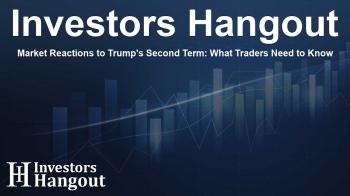Market Reactions to Trump's Second Term: What Traders Need to Know

Market Response to Trump's Tariff Talks
As traders prepare for what many are calling Trump 2.0, the financial world is buzzing with anticipation. Early discussions suggest that U.S. President Donald Trump is considering imposing a significant 25% tariff on Canadian goods. Such news tends to create ripples across the trading landscape, particularly impacting currencies like the Canadian dollar, often referred to as the 'loonie.'
The Immediate Impact on the Canadian Dollar
At a time when trading volumes are typically low, the announcement immediately affected the loonie, leading to a sharp decline of 200 pips against its U.S. counterpart. This sudden movement can spark adrenaline-fueled trading sessions, reminiscent of previous experiences during Trump's first term.
Volatility and Opportunity in Trading
Market analysts suggest that this trading environment is particularly favorable for agile traders ready to act on fast-paced market movements. Nick Twidale, chief market analyst at ATFX Global in Sydney, notes that while trading during such volatile times can be challenging, it also presents numerous opportunities for profit, especially for those positioned to respond quickly.
Understanding Market Sentiment
Despite the intense fluctuations, the majority of traders are advised to focus on tangible actions rather than words. As the market processes statements and proposed actions from Trump, many expect a more measured response as traders adapt to the evolving economic landscape.
Adapting Strategies in a Shifting Market
As Trump prepares his administration for a new phase, it’s crucial for both small and large investors to monitor headlines closely. Bart Wakabayashi from State Street in Tokyo emphasizes the importance of understanding the details surrounding potential tariffs, indicating that the specific timing of any tariff implementations could significantly influence trading strategies.
Preparing for Increased Volumes
Traders, eager to capitalize on the anticipated volatility, are likely to exhibit strong activity as U.S. equity markets resume trading post-inauguration. Michael McCarthy from Moomoo Australia highlights that, despite the inherent risks, these volatile periods can create substantial opportunities for profit.
Long-term Strategies Amidst Short-term Changes
The environment is not just about quick trades; larger financial institutions like JPMorgan are reportedly establishing strategies to combat the unpredictability of Trump's administration. Mary Erdoes, head of asset and wealth management at JPMorgan, described a proactive approach, setting up a 'war room' to navigate through the whirlwind of executive orders and their impacts on the market.
Supply Chains and Market Dynamics
Beyond immediate trading actions, the discussion regarding tariffs leads to broader implications on global supply chains. Tai Hui from JPMorgan highlights the potential increase in demand for transportation and shipping services, underscoring the interconnected nature of these economic factors.
The Power of Social Media in Trading
In this digital age, many traders continuously monitor Trump's social media channels for updates, reflecting the significant influence his communications wield over market dynamics. Staying informed in real-time can be crucial for traders aiming to navigate this ever-changing landscape.
Frequently Asked Questions
How will Trump's tariff plans affect the Canadian dollar?
Tariff plans typically lead to immediate fluctuations in the Canadian dollar, especially affecting its exchange rate against the U.S. dollar.
What strategies should traders adopt in a volatile market?
Traders should focus on agility, staying informed about news developments and being ready to react quickly to market changes.
Are larger investors affected differently by Trump's policies?
Yes, larger investors often employ more comprehensive strategies, considering long-term impacts while smaller traders may capitalize on short-term volatility.
What is the significance of social media in trading today?
Social media allows traders to receive real-time updates, making it easier to react promptly to announcements that may impact the markets.
How can understanding global supply chains affect trading decisions?
Understanding global supply chains helps traders anticipate market demands and regional impacts of policies, which can influence their trading strategies.
About The Author
Contact Henry Turner privately here. Or send an email with ATTN: Henry Turner as the subject to contact@investorshangout.com.
About Investors Hangout
Investors Hangout is a leading online stock forum for financial discussion and learning, offering a wide range of free tools and resources. It draws in traders of all levels, who exchange market knowledge, investigate trading tactics, and keep an eye on industry developments in real time. Featuring financial articles, stock message boards, quotes, charts, company profiles, and live news updates. Through cooperative learning and a wealth of informational resources, it helps users from novices creating their first portfolios to experts honing their techniques. Join Investors Hangout today: https://investorshangout.com/
The content of this article is based on factual, publicly available information and does not represent legal, financial, or investment advice. Investors Hangout does not offer financial advice, and the author is not a licensed financial advisor. Consult a qualified advisor before making any financial or investment decisions based on this article. This article should not be considered advice to purchase, sell, or hold any securities or other investments. If any of the material provided here is inaccurate, please contact us for corrections.

